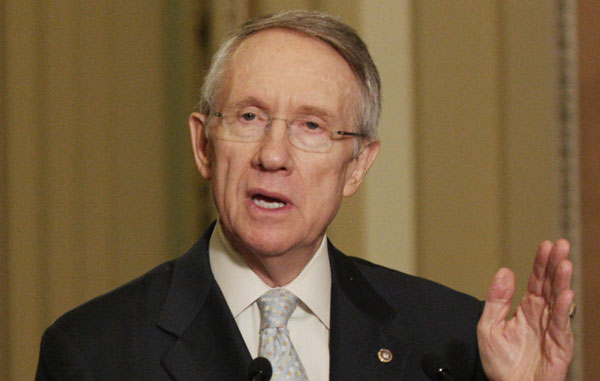Full Slate Awaits Senate
Jul 31, 2020205.7K Shares3.3M Views
Senate Majority Leader Harry Reid (D-Nev.)(WDCpix)
A week ago, Senate leaders approached a calendar full of pressing legislation with heads full of optimism that they could wrap it up before the July 4 recess.
Then reality hit.
Faced with proposals to fund the Iraq war, address the growing housing crisis, renew the Bush administration’s electronic surveillance program and prevent a steep cut in physicians’ Medicare payments, the world’s greatest deliberative body passed only the first. Rather than returning home for the break with a list of legislative achievements, lawmakers instead left Washington to explain to constituents why they couldn’t get anything done.
“All week long,” said Senate Majority Leader Harry Reid (D-Nev.) on Thursday, “we have been stuck in the sand, spinning our wheels.”
Illustration by: Matt Mahurin
In the case of the housing and Medicare, the proposals are just offering Band-Aids when something closer to a tourniquet is required. Congress, experts say, will almost almost certainly have to confront the expanding foreclosure crisis again next year, while the Medicare proposal simply provides 18-month physician relief.
Americans are growing weary of a bickering Congress that can’t seem to pass much at all, even if it’s just temporary fixes. With each party hurling blame at the other, voters are expressing frustration with both. The latest Associated Press/Ipsos poll puts Congress’ approval rate at a dismal 23 percent — well below the 29 percent for President George W. Bush. Congress’ disapproval rate, meanwhile, stands at 72 percent, according to the same poll.
That disenchantment with Washington, combined with a growing national anxiety over accelerating fuel prices and a rising foreclosure rate, puts even greater pressure on upper chamber lawmakers to iron out their differences when they return.
“People are scared, and people want something done,” said Julian E. Zelizer, a congressional historian at Princeton University.
But it won’t be simple. Despite bipartisan agreement on much of the policy now under consideration, political jockeying for an election-year advantage has proved the more powerful force.
Both parties, for example, want to stave off the scheduled 10.6 percent cut in Medicare payments to doctors that is set to go into effect July 1. But the Democrats’ Medicare bill has been roundly criticized by Senate Republicans and the White House for including cuts to the private insurance plans operating under the Medicare Advantage program. House Republicans shocked observers last week by helping Democrats pass the bill by a remarkable 355 to 59, but upper chamber Republicans, led by Sen. Charles Grassley (R-Iowa), have defeated the measure twice this month.
Providing some cushion, the Bush administration last week announced a 10-day freeze on the physician cuts. But that’s not much time for Congress to reach a compromise on something as contentious as cuts to the Medicare Advantage program. Also, the issue will resurface quickly: the so-called “doc-fix” proposal prevents the cut only until the end of 2009.
Despite an outcry from civil libertarians, the electronic surveillance bill was also expected to pass easily last week. Instead it was held up by several Democrats who objected to a provision that lets telecom companies off the hook for any illegal acts they might have committed while cooperating in the program. That proposal provides the administration with wiretapping authority through 2012. Reid has indicated the bill will be the first taken up when lawmakers return to Washington next week.
The Senate housing legislation also has broad bipartisan support. Yet the proposal stalled last week over an effort by Sen. John Ensign (R-Nev.) to attach billions of dollars in tax credits for renewable energies. Reid spokeswoman Regan Lachapelle said Monday that Democrats hope to tackle the housing bill immediately after the surveillance debate, but Ensign has shown no signal of letting up in his push to force a vote on his tax amendment. Something, though, will have to give: failure to address housing before the election, experts say, could spell political doom for lawmakers facing tight races in November.
“Members of both parties need to show some accomplishment on that front,” said David Mayhew, Sterling professor of political science at Yale University and author of “Congressional Elections: The Case of the Vanishing Marginals.”
Other experts say the current bill is just the first step toward a larger effort to tackle the foreclosure problem.
“[A housing bill] would be a very powerful symbol that the Democratic Congress could do something — and will do something — if it maintains its majority,” Zelizer.

Paolo Reyna
Reviewer
Paolo Reyna is a writer and storyteller with a wide range of interests. He graduated from New York University with a Bachelor of Arts in Journalism and Media Studies.
Paolo enjoys writing about celebrity culture, gaming, visual arts, and events. He has a keen eye for trends in popular culture and an enthusiasm for exploring new ideas. Paolo's writing aims to inform and entertain while providing fresh perspectives on the topics that interest him most.
In his free time, he loves to travel, watch films, read books, and socialize with friends.
Latest Articles
Popular Articles

